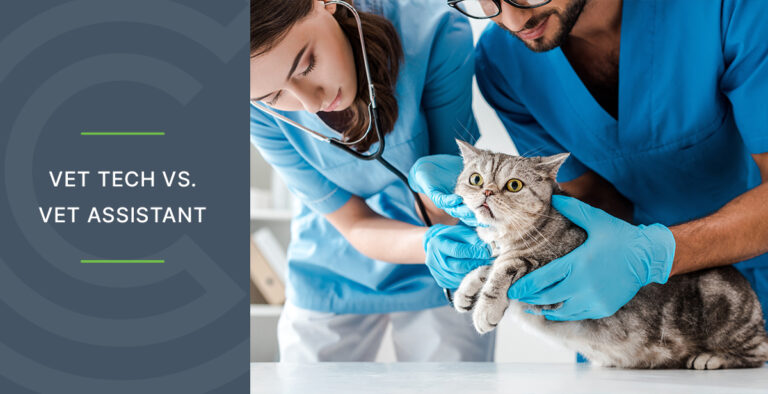If you’re passionate about animals and considering a career in veterinary medicine, you may have come across the roles of Veterinary Technician (Vet Tech) and Veterinary Assistant (VA). While these positions share the common goal of caring for animals, they differ significantly in terms of responsibilities, education, and career opportunities. Understanding what is the difference between a Vet Tech vs. Vet Assistant can help you choose the best path for your interests and career aspirations. In this blog, we’ll explore these key differences and provide insights to guide your decision.
What Does a Vet Tech Do?
A Veterinary Technician plays a critical role in animal healthcare by performing advanced medical tasks under the supervision of a veterinarian. Vet Techs are often compared to registered nurses in human medicine, as they are trained to assist in diagnostics, treatment, and surgical procedures.
Key Responsibilities of a Vet Tech:
– Conducting diagnostic tests, such as bloodwork and X-rays
– Administering medications and vaccinations
– Assisting in surgical procedures, including anesthesia monitoring
– Educating pet owners on preventive care and treatment plans
– Maintaining medical records and ensuring proper documentation
– Providing emergency care in critical situations
Education and Certification:
To become a Vet Tech, individuals must complete an accredited Veterinary Technology program, which typically takes two years to earn an Associate’s Degree. After graduation, candidates must pass the Veterinary Technician National Exam (VTNE) to become licensed, registered, or certified, depending on state regulations.
What Does a Vet Assistant Do?
A Veterinary Assistant supports the veterinarian and Vet Tech by performing basic animal care tasks. This role focuses more on administrative duties and hands-on animal care rather than advanced medical procedures.
Key Responsibilities of a Vet Assistant:
– Feeding, bathing, and exercising animals
– Cleaning and sterilizing equipment and examination rooms
– Restraining animals during examinations and procedures like blood draws, rectal exams, ear cleaning, etc.
– Preparing animals and supplies for surgery
– Assisting with administrative tasks, such as scheduling appointments and updating patient records
– Pharmacology, including basic dosage calculations and drug uses, reactions, and routes
– Preparation of various laboratory procedures and testing protocols such as microscopic fecal exam and skin scraping, DTM, urine specific gravity and sediment exam, and staining techniques
Education and Training:
Veterinary Assistants can complete a Veterinary Assistant certificate program and are eligible to take the approved vet assistant examination to earn the Approved Veterinary Assistant (AVA) designation and receive a documenting certificate upon successful completion.
Work Environment and Skills Needed
Both Vet Techs and Vet Assistants work in environments that require physical stamina, emotional resilience, and a genuine love for animals. However, the specific skills and daily tasks differ:
Skills for Vet Techs:
– Strong understanding of animal anatomy and medical procedures
– Ability to use diagnostic equipment and laboratory tools
– Critical thinking and problem-solving skills
– Proficiency in medical record-keeping
Skills for Vet Assistants:
– Excellent organizational and multitasking abilities
– Basic understanding of animal behavior
– Effective communication with pet owners and team members
– Attention to detail for cleaning and preparation tasks
Career Opportunities and Growth
Both Vet Techs and Vet Assistants have career opportunities, with the growth potential and specialization varies:
Career Opportunities for Vet Techs:
– Specializing in areas like dentistry, anesthesia, or emergency care
– Working in research labs or animal rehabilitation centers
– Pursuing leadership roles in veterinary practices
Career Opportunities for Vet Assistants:
– Working in animal shelters, zoos, animal clinics, research laboratories, or pet boarding facilities
– Supporting wildlife rehabilitation efforts
Education Pathways at Caris College
If you’re interested in pursuing a career as a Veterinary Assistant, The Caris College Veterinary Assistant program includes hands-on training in a fully operational clinical lab and industry-recognized training and certification requirements to fulfill a variety of roles at any veterinary office. With hands-on learning, experienced instructors, and a supportive environment, our programs prepare students for a career in animal healthcare. Learn more about our offerings by contacting us today!
Understanding what is the difference between a Vet Tech vs. Vet Assistant is crucial for anyone considering a career in veterinary medicine. While both roles share a dedication to animal care, they differ in terms of responsibilities, education, and career growth. Whether you’re drawn to the advanced medical tasks of a Vet Tech or the hands-on care of a Veterinary Assistant, there’s a path for you. Explore your options and start your journey with Caris College. Visit our campus to learn more and take the first step toward a career in animal healthcare.
